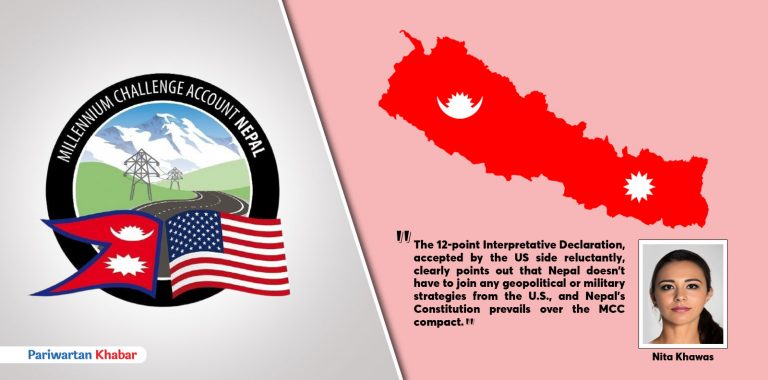
After the MCC compact was forcefully ratified with immense controversy in February last year, it seems that the Nepali people have lost the memory that they hold huge resistance towards the MCC compact ever. Now they no longer keep a watchful eye on the Compact, life returning to normal. However, the ceremony of MCC compact’s entry into force (EIF), hold by MCC Headquarter and the Nepal government on 30 August quietly, once again ignited people’s antipathy to the unfair assistance projects from USA. As the implementation of MCC compact has become a fixed item, the strategic and military project, in the name of economic initiative, is entering into Nepal, ready to swallow up the country.
Formal Entry into Force of MCC
MCC-Nepal projects “aim to maintain the road quality and improve the availability and reliability of electricity, further to facilitate the cross border power trade between Nepal and India”, according to MCC’s statements. The 12-point Interpretative Declaration, accepted by the US side reluctantly, clearly points out that Nepal doesn’t have to join any geopolitical or military strategies from the U.S., and Nepal’s Constitution prevails over the MCC compact. Although the US side has made a verbal promise to separate the aid projects from its strategic diplomacy, no one trusts its words “just for assistance” based on its intervention disguised as investment in other countries. Most Nepalis consider that MCC is just a potential form of US imperialism under the cloak of construction projects.
As for MCC funding source, the U.S. plans to invest $500 million in Nepal’s power and transmission infrastructure, and the Nepal government provides $19.7 million for improvement of parts of the East-West Highway. After 5 years since EIF from 30 August, projects will be handed over to Nepal government by MCC. Actually, the implementation of MCC projects is facing many practical obstacles, including obstructions and protests against land compensation and forests cut. On 7 September, residents of Tanahun district protested against land acquisition for the extension project of MCC transmission line, and they demanded to stop the land acquisition process, worrying that the farmland will be damaged. Local residents even established a concern committee to ensure long-lasting and serious-minded protests.
It is uncertain that whether MCC projects will be completed on time or not. Former prime minister Jhala Nath Khanal and the CPN(Unified Socialist) leader Madhav Kumar Nepal think that the MCC projects can’t be completed within 5 years. A new concern arises that whether the Nepali people have to pay for unfinished MCC projects after 5 years.
Lasting protests from the Neplai people
All major parties, including the ruling parties, have ever expressed their dissatisfaction over MCC agreement. The Prime Minister Dahal also required that the 12-point Interpretative Declaration must be admitted. Amid intense protests and dissents from all sides, the US embassy made a written clarification to accept the Interpretative Declaration about MCC made by the Nepal parliament. But the Declaration was not included in the text and duplicate of the MCC agreement. On 22 August, Communist Party of Nepal (Chand-led) and Communist Party of Nepal (Revolutionist Maoist) announced a week-long protest against MCC. They directly pointed out that MCC would help the U.S. to establish a military base in Nepal, and they demanded to abolish MCC agreement. Again on 1 September, Communist Party of Nepal under Chand’s leadership extended the protest plan to 2 October. Also, a monitoring committee led by its vice-chairman was formed by CPN (Unified Socialist) in September to monitor the implementation of projects. If any violations against the 12-point Interpretative Declaration are found in the implementation process, the monitoring committee will demand to terminate construction. At the all-party meeting hold by Dahal on 10 September, a legislator of Nepal Worker Peasants Party queried Dahal that why the US army arrived in Nepal after the implementation of MCC compact. The legislator also suggested Dahal to stay prudent when dealing with Nepal-U.S. diplomacy, hence to prevent Nepal becoming the next Ukraine.
In 2022 February, Donlad Lu, Assistant Secretary Bureau of South and Central Asian Affairs of the US Department of State, delivered his ultimatum to the Nepal government that if MCC compact can’t be ratified by Nepal House of Representatives, Washington would be forced to “review” its ties with Nepal. It directly reveals that the MCC compact is associated with the US’s diplomatic and strategic decisions, and thus the Nepalis’ fear is not groundless.










